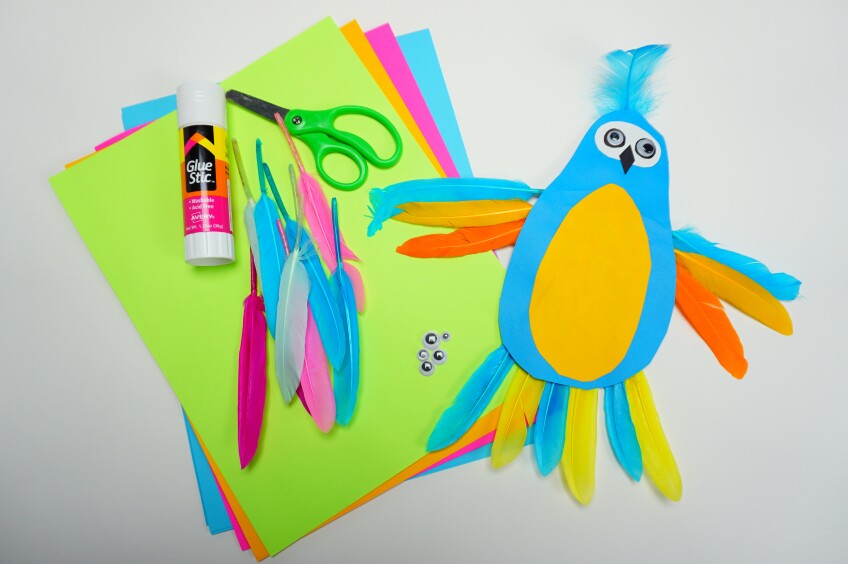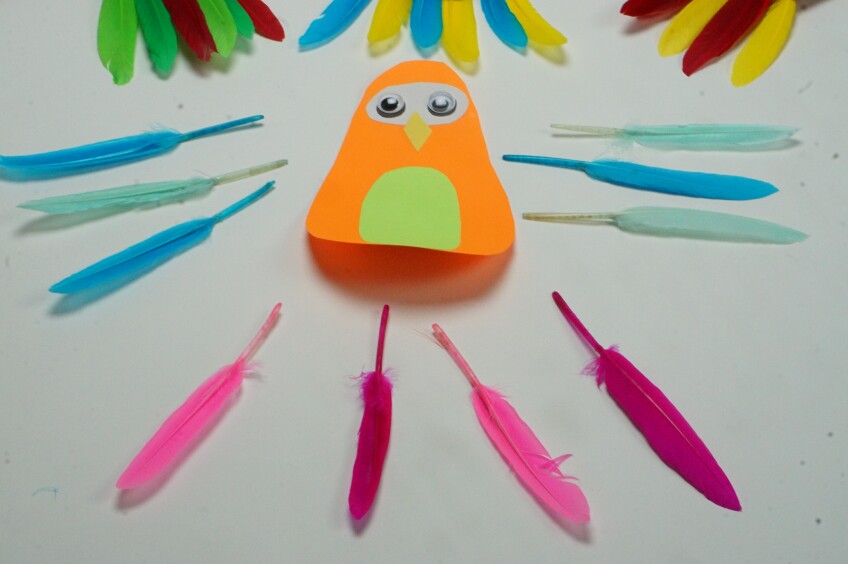Play With This Pattern Parrot Craft
Patterns can be found everywhere, even in nature! In this fun craft activity, your child will create original patterns to make a colorful parrot. This activity is inspired by the patterns we see in animals, like the black-and-white striped patterns of a zebra or the feather patterns in a peacock's tail.
Learning Goals
This activity will help your child:
- Create original patterns
- Make connections between mathematical concepts and their world
- Develop pattern knowledge
Materials

- Construction paper
- Colorful feathers
- Glue stick
- Scissors
- Googly eyes (optional)
Vocabulary
A pattern is a sequence of things in our world — like sounds, colors, or shapes — that repeats over and over and follows a predictable rule. Patterns help children predict what will happen next and are an important area of mathematics.
Step-by-Step Instructions
1. Cut an avocado shape out of construction paper for the body. Then, cut out a few other shapes for the stomach and face. Glue them all together.
2. Create a colorful pattern with feathers for the wings. For example, red, orange, green, red, orange, green. Ask your child:
- "How did you know what the pattern is?"
- "What part repeats?"

3. Once you have decided on your pattern, glue the feathers.
4. Copy the pattern on the other wing. Remember: Whatever colors you use for one wing, you must copy the pattern on the other wing. Does your pattern follow the same rule?
5. Next, create a new pattern for the tail. Lay out your pattern. For example, blue, yellow, blue, yellow. Challenge your child to complete the pattern. You can ask, "Blue, yellow, blue... Can you guess what color comes next? Yellow, that's great!"
6. Compare the patterns. Ask your child, "How are these patterns the same or different?"

7. Create additional pattern parrots to explore more patterns!
Keep the Conversation Going
Play with your pattern parrot! What sounds does a parrot make? Play with repetition using sound and rhythm. Try to drum a beat while pointing to the pattern and pause to let your child answer what comes next. For example, assign your child to sing "green" in the following chant: "Red, green, orange. Red, green, orange. Red, green, orange."
Book Suggestions
"A-B-A-B-A—A Book of Pattern Play" (Ages 5-9) written by Brian P. Cleary and illustrated by Brian Gable
In this playful book about patterns, your child will engage with repeating sequences of shapes, colors, objects and more.

"Patterns / Patrones" (Ages 2-5) By Kristen Reed and Jessica Young
Have fun with your child by noticing the patterns around us that you can see, hear, or touch.
Families in Action
A local family made their own patterns parrot using construction paper and ribbon stapled together.

Corresponding Standards
California Preschool Learning Foundations
Algebra and Functions
- 2.0: Children expand their understanding of simple, repeating patterns.
- 2.1 Recognize and duplicate simple repeating patterns.
- 2.2 Begin to extend and create simple repeating patterns.
Head Start Early Learning Outcomes Framework
- Goal P-Math 7: Child understands simple patterns.


